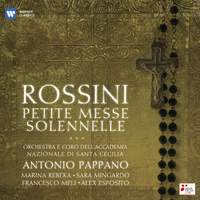Recording of the Week,
Pappano conducts Rossini’s Petite messe solennelle
Rossini really knew how to live: having made a fortune penning operas at an astonishing pace during his twenties and thirties, he had pretty much retired from musical life by the time he was forty and spent the next twenty years or so indulging his passions for fine wines and cuisine (his creative legacy includes the indulgent dish ‘Tournedos Rossini’!). But he didn’t abandon music altogether: after leaving Italy for Paris in 1855, the salon culture of his new social circle led him to scribble over a hundred smaller-scale pieces which he ruefully dubbed his ‘Péchés de vieillesse’ or ‘Sins of Old Age’. These ‘sins’ were intended only for domestic performance at ‘soirées musicales’ which he hosted with his second wife, the former model Olympe Pélissier (the glamorous guest-list often included Liszt and Meyerbeer). The most ambitious of Rossini’s ‘Péchés’ was the Petite messe solennelle (thought to have been written for a recently-bereaved aristocratic family who frequented Rossini's soirées), but even this was still very much domestic in conception, being originally scored for just twelve singers, two pianos and harmonium.

I’m sure I won’t be the first person to observe that the ensuing work is neither ‘petite’ nor especially ‘solennelle’ – Rossini clearly had his tongue firmly in his cheek in describing it as such, because most of the work brims over with sunny vitality, and even the most sombre sections are never small-scale or understated (especially in the orchestrated version, which the composer prepared himself in his last years, although it wasn’t performed until after his death).
Though very popular with choral societies, Rossini’s ‘Little Mass’ hasn’t had all that many outings on disc – I first got to know the piece through an old Decca recording with Mirella Freni and Pavarotti – so I was very excited to receive this new set from Sir Antonio Pappano and his classy Santa Cecilia orchestra and chorus. Their blazingly theatrical recording of Rossini’s Stabat Mater was one of my favourite discs of 2010, and was followed by an equally thrilling account of William Tell, so these musicians have serious pedigree when it comes to Rossini. Pappano’s reading is bursting with brio and never overdoes the occasional moments of darkness in the score, but at times there are even distinct echoes of Verdi's Requiem – another sacred work from an opera-composer that’s so theatrical in temperament you can practically smell the greasepaint.
One of the hallmarks of Pappano’s previous recordings with these forces has been his happy knack of assembling solo quartets of apparently very disparate voices which somehow come together quite magically, and this musical alchemy is in evidence again here: he really has the balancing of light and dark timbres down to a fine art. I’ve been hearing great things about the young Latvian soprano Marina Rebeka over the past year or so: she’s had several operatic triumphs recently when stepping in at short notice after cancellations by starrier singers, and on this showing her big, shiny voice will surely propel her into the firmament in the near future. Her bright, glossy tone is heard to great effect in the ‘O salutaris hostia’, and contrasts beautifully with Sara Mingardo’s wine-dark, dusky contralto in the ‘Qui tollis’. For me, though, the stand-out performance comes from tenor Francesco Meli, audaciously old-school with his liberal portamenti in the unapologetically jolly ‘Domine Deus’ and clearly having great fun in the process. This is a gorgeous, golden voice that seems to hark back to the gramophone era – shades of the young(ish) Pavarotti on that old Decca recording I mentioned earlier.
This vivacious account of an ‘old man's folly’ is just the disc to welcome in spring, then: listening to the irrepressible, bouncy ‘Cum Sancto Spiritu’, it’s been nigh-on impossible to concur with T.S. Eliot that April is the cruellest month!
Marina Rebeka (soprano), Sara Mingardo (contralto), Francesco Meli (tenor), Alex Esposito (bass), Orchestra e Coro dell’Accademia Nazionale di Santa Cecilia, Sir Antonio Pappano
Available Formats: 2 CDs, MP3, FLAC



